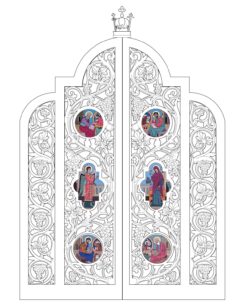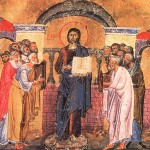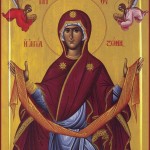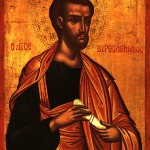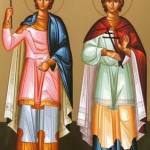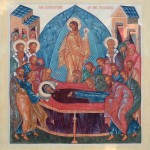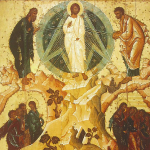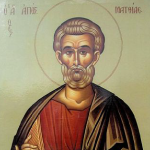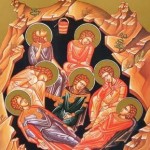The First Ecumenical Council [Nicaea, 325] decreed that the Church year should begin on September 1. The month of September was, for the Hebrews, the beginning of the civil year (Exodus 23:16), the month of gathering the harvest and of the offering of thanks to God. It was on this feast that the Lord Jesus entered the synagogue in Nazareth (Luke 4:16-21), opened the book of the Prophet Isaiah and read the words: The Spirit of the Lord God is upon Me; because the Lord hath anointed Me to preach good tidings unto the meek; He hath sent Me to bind up the brokenhearted, to proclaim liberty to the captives, and the opening of the prison to them that are bound; to proclaim the acceptable year of the Lord, and the day of vengeance of our God; to comfort all that mourn (Isaiah 61:1-2). The month of September is also important in the history of Christianity, because Emperor Constantine the Great was victorious over Maxentius, the enemy of the Christian Faith, in September. Following this victory, Constantine granted freedom of confession to the Christian Faith throughout the Roman Empire. For a long time, the civil year in the Christian world followed the Church year, with its beginning on September 1. The civil year was later changed, and its beginning transferred to January 1. This occurred first in Western Europe, and later in Russia, under Peter the Great. (Prologue of Ohrid)
Author: Michael Winn
August 31, 2013 The Placing of the Sash of our Most Holy Lady the Mother of God in Calcoprateia
After her Dormition [Falling-asleep], the Holy Theotokos gave her girdle [sash] to the Apostle Thomas. That girdle was later brought to Constantinople and kept in a sealed reliquary in the church of the Mother of God at Blachernae, the royal foundation [Zaduzbina] of Empress Pulcheria. This reliquary was never opened until the time of Emperor Leo the Wise (886-912 A.D.). Leo’s wife, the Empress Zoe, became mentally ill and, according to a mysterious vision, she desired that the girdle of the Holy Theotokos be placed on her. The emperor implored the patriarch and the reliquary was opened and the girdle was removed and placed on the ailing empress. The empress was immediately healed. This feast was instituted in commemoration of this miracle. One part of the girdle is to be found in Zugdid, Georgia. That is to say: the daughter of Emperor Romanus was healed with the aid of this girdle and later when her father married her to the Georgian Emperor Abuchaz, she took a part of that girdle with her. By order of the Russian Emperor Alexander I, a special church was built in Mingrelia in Zugdid where that part of the miracle-working garment of the Holy Theotokos is kept.After her Dormition [Falling-asleep], the Holy Theotokos gave her girdle [sash] to the Apostle Thomas. That girdle was later brought to Constantinople and kept in a sealed reliquary in the church of the Mother of God at Blachernae, the royal foundation [Zaduzbina] of Empress Pulcheria. This reliquary was never opened until the time of Emperor Leo the Wise (886-912 A.D.). Leo’s wife, the Empress Zoe, became mentally ill and, according to a mysterious vision, she desired that the girdle of the Holy Theotokos be placed on her. The emperor implored the patriarch and the reliquary was opened and the girdle was removed and placed on the ailing empress. The empress was immediately healed. This feast was instituted in commemoration of this miracle. One part of the girdle is to be found in Zugdid, Georgia. That is to say: the daughter of Emperor Romanus was healed with the aid of this girdle and later when her father married her to the Georgian Emperor Abuchaz, she took a part of that girdle with her. By order of the Russian Emperor Alexander I, a special church was built in Mingrelia in Zugdid where that part of the miracle-working garment of the Holy Theotokos is kept. (Prologue of Ohrid)

[button type=”download” url=”https://lit.royaldoors.net/wp-content/uploads/2013/08/9999-08-31-word.doc” color=”magenta” align=”right”]Word[/button] [button type=”download” url=”https://lit.royaldoors.net/wp-content/uploads/2013/08/9999-08-31-pdf.pdf” color=”magenta” align=”right”]PDF[/button] [button type=”download” url=”https://lit.royaldoors.net/epub/08-31-epub – Royal Doors.epub” color=”magenta” align=”right”]EPUB[/button]
VESPERS
At Psalm 140
In Tone 4
3. For with the Lord there is mercy, and with Him there is plentiful redemption;
and He shall redeem Israel from all its iniquities.
The shrine which holds your belt, O Theotokos,
is ever known by your servants to be an ark of sanctification.
It is our glory and boast; a sacred wall surrounding us;
a fountain of healings!
Therefore being divinely gathered today,
we hymn your mighty acts
and the vast abyss of your wonders!
2. Praise the Lord, all the nations;
proclaim His glory, all you people.
Behold the all-glorious place!
Behold the ever-radiant temple in which a treasure has been laid:
the belt of the Mother of the divine Son!
People, come! Draw forth enlightenment and mercy,
and shout with a grateful heart: all-holy Virgin, we bless you,
for we have been saved by your childbearing!
1. Strong is the love of the Lord for us;
eternally will His truth endure.
We rejoice and keep the feast of the placing of your belt, O Theotokos,
for today you have granted it to your people,
it is a sacred garment, wealth that cannot be stolen,
a precious gift and river of healings
overflowing with spiritual treasures!
In Tone 2, Glory… Now…
All-pure Theotokos, the Church of God is robed in your holy belt,
as with a supremely shining diadem!
It is radiant today and cries out to you rejoicing,
rejoice, sovereign Lady!
Precious diadem and crown of divine glory!
Rejoice, for you alone are the fullness of glory and everlasting gladness!
Rejoice, refuge of those who run to you:
our intercessor and salvation!
Readings
Genesis 28:10-17
Ezekiel 43:27; 44:1-4
Proverbs 9:1-11
Aposticha
In Tone 2, Glory… Now…
Having cleansed our heart and mind,
let us keep feast together with the angels,
joyfully addressing the song of David
to the maiden Bride of the King of all, Christ our God,
saying: arise, Lord, into your resting place,
both You and the ark of Your holiness!
For You have adorned her as a beautiful palace,
giving her as an inheritance to Your people, O Master,
to preserve and shelter them from their enemies,
by Your mighty power, through her supplications!
Troparion
In Tone 8
Protection of humans, ever-Virgin Mother of God* as a mighty bulwark for your city* you gave your pure body’s robe and sash.* They remained incorrupt by your giving birth without seed.* For in you are nature and time made new.* Therefore, we pray you, give peace to your city** and to our souls great mercy.
DIVINE LITURGY
Troparia and Kontakia
Troparion, Tone 8: Protection of humans, ever-Virgin Mother of God* as a mighty bulwark for your city* you gave your pure body’s robe and sash.* They remained incorrupt by your giving birth without seed.* For in you are nature and time made new.* Therefore, we pray you, give peace to your city** and to our souls great mercy.
Glory be to the Father and to the Son and to the Holy Spirit, now and for ever and ever. Amen.
Kontakion, Tone 2: Your womb which received divinity* was girded about by your precious sash, O Mother of God.* It became an unconquerable force for your city* and a generous treasury of good things:* O you, the only virgin who ever gave birth.
Prokeimenon, Tone 3
My soul magnifies the Lord, and my spirit has rejoiced in God my Saviour.
verse: Because he has regarded the humility of His handmaid; for behold, all generations shall call me blessed. (Luke 1:46-48)
Epistle
Hebrew 9:1-7
Alleluia, Tone 8
verse: Rise up, O Lord, to the place of Your rest, You and the ark of Your holiness.
verse: The Lord swore an oath to David, and will not go back on His word. (Psalm 131:8,11)
Gospel
Luke 10:38-42, 11:27-28
Communion Hymn
I will take the cup of salvation;* and I will call upon the name of the Lord.* Alleluia, alleluia,* alleluia. (Psalm 115:13)
August 25, 2013 14th Sunday after Pentecost, Octoechos Tone 5 Return of the Relics of the Holy Apostle Bartholomew; Holy Apostle Titus
Today commemorates the translation of the relics of St. Bartholomew, although his main feast is celebrated on June 11. When this great apostle was crucified in Albanopolis [Derbend] in Armenia, Christians removed his body and honorably buried it in a lead sarcophagus. When numerous miracles occurred over the grave of the apostle, especially healings of the sick, because of which the number of Christians increased, the pagans then took the sarcophagus containing the relics of Bartholomew and tossed it into the sea. At the same time they also threw four more sarcophagi into the sea containing the relics of four martyrs: Papian, Lucian, Gregory and Acacius. However, by God’s providence, the sarcophagi did not sink but were carried by the current and floated: Acacius to the town of Askalon, Gregory to Calabria, Lucian to Messina, Papian to the other side of Sicily and Bartholomew to the island of Lipara. By some mysterious revelation Agathon, the Bishop of Lipara, learned of the approaching relics of the holy Apostle Bartholomew to Lipara. Agathon, with the clergy and people, came to the shore to receive the sarcophagus with great joy. On that occasion, many healings of the sick occurred from the relics of the holy apostle. The relics were placed in the church of St. Bartholomew and there they reposed until the time of Theophilus the Iconoclast about the year 839 A.D. and since the Muslims threatened Lipara, the relics of the apostle were translated to Benevento. Thus, the Lord glorified His apostle by miracles both during his life and after his death.
Titus was one of the Seventy [Apostles]. He was born in Crete and educated in Greek philosophy and poetry. Following a dream, he began reading the Prophet Isaiah and doubted all the wisdom of the Hellenes. Hearing about Christ the Lord, Titus traveled to Jerusalem with other Cretans and personally heard the words of the Savior and witnessed His mighty works. His young heart completely adhered to Christ. Later, he was baptized by the Apostle Paul whom he served as a son to a father in the work of evangelization. Paul loved Titus so much that, at times, he referred to him as son: “To Titus, my beloved son” (Titus 1:4) and, at times, brother: “I urged Titus to go to you and I sent the other brother with him” (2 Corinthians 12:18). Titus traveled extensively with the great apostle of the people [St. Paul] and was appointed by him as the bishop of Crete. Titus was present at the suffering and death of Paul in Rome and honorably buried the body of his teacher and spiritual father. After that, Titus returned to Crete where, with great success, he baptized the pagans and prudently governed the Church of God until old age. Titus entered into rest at the age of ninety-four. (Prologue of Ohrid)
August 18, 2013 13th Sunday after Pentecost, Octoechos Tone 4 Post-feast of the Dormition; Holy Martyrs Florus and Laurus
Florus and Laurus were brothers in the flesh, and in spirit and in vocation. Both were zealous Christians and, by occupation, stonecutters. They lived in Illyria. A pagan prince hired them for the building of a temple to the idols. It happened that during their work, a piece of stone flew and struck the eye of the pagan priest’s son who was observing the work of the builders with curiosity. Seeing his son blind and bloody, the pagan priest began to shout at Florus and Laurus and wanted to beat them. Then, the holy brothers said to him that if he would believe in the God in whom they believed, his son would be healed. The pagan priest promised. Florus and Laurus prayed with tears to the one, living, Lord God and traced the sign of the Cross over the child’s injured eye. The child was immediately healed and his eye became whole just as it had been. Then the pagan priest Merentius and his son were baptized and, shortly after that, both suffered for Christ by fire. When they completed the temple, Florus and Laurus placed a cross on it, summoned all Christians and consecrated it in the name of the Lord Jesus with an all-night vigil of hymn singing. Hearing of this, the Illyrian deputy burned many of those Christians and threw Florus and Laurus alive in a well and then filled it with dirt. Later, their relics were revealed and translated to Constantinople. These two wonderful brothers suffered and were martyred for Christ and were glorified by Christ in the second century. (Prologue of Ohrid)
August 15, 2013 The Dormition of the Most Holy Lady, the Theotokos and Ever-Virgin Mary
The Lord Who, on Mt. Sinai, commanded by His Fifth Commandment: “Honor your father and your mother” (Exodus 20:12), showed by His own example how one should respect one’s parent. Hanging on the Cross in agony, He remembered His mother and indicating to the Apostle John, said to her: “Woman behold your son” (St. John 19:26). After that, He said to John: “Behold your mother” (St. John 19:27). And so providing for His mother, He breathed His last. John had a home on Zion in Jerusalem in which the Theotokos settled and remained there to live out the end of her days on earth. By her prayers, gentle counsels, meekness and patience, she greatly assisted the apostles of her Son. Primarily, she spent her entire time in Jerusalem often visiting those places which reminded her of the great events and of the great works of her Son. She especially visited Golgotha, Bethlehem and the Mount of Olives. Of her distant journeys, her visit to St. Ignatius the Theophorus [God-bearer] in Antioch is mentioned, as well as her visit to Lazarus (whom our Lord resurrected on the fourth day), the Bishop of Cyprus, her visit to the Holy Mountain [Athos] which she blessed and her stay in Ephesus with St. John the Evangelist [The Theologian] during the time of the great persecution of Christians in Jerusalem. In her old age, she often prayed to the Lord and her God on the Mount of Olives, the site of His Ascension, that He take her from this world as soon as possible. On one occasion, the Archangel Gabriel appeared to her and revealed to her that within three days she will find repose. The angel gave her a palm-branch to be carried at the time of her funeral procession. She returned to her home with great joy, desiring in her heart once more to see in this life, all of the apostles of Christ. The Lord fulfilled her wish and all of the apostles, borne by angels in the clouds, gathered at the same time at the home of John on Zion. With great rejoicing, she saw the holy apostles, encouraged them, counseled them and comforted them. Following that, she peacefully gave up her soul to God without any pain or physical illness. The apostles took the coffin with her body from which an aromatic fragrance emitted and, in the company of many Christians, bore it to the Garden of Gethsemane to the sepulchre of [her parents], Saints Joachim and Anna. By God’s Providence, they were concealed from the evil Jews by a cloud. Anthony, a Jewish priest, grabbed the coffin with his hands with the intention of overturning it but, at that moment, an angel of God severed both his hands. He then cried out to the apostles for help and was healed since declaring his faith in the Lord Jesus Christ. The Apostle Thomas was absent, again according to God’s Providence, in order that a new and all-glorious mystery of the Holy Theotokos would again be revealed. On the third day, Thomas arrived and desired to venerate [kiss] the body of the Holy All-pure one. But when the apostles opened the sepulchre, they found only the winding sheet and the body was not in the tomb. That evening, the Theotokos appeared to the apostles surrounded by a myriad of angels and said to them: “Rejoice, I will be with you always”. It is not exactly known how old the Theotokos was at the time of her Falling Asleep but the overwhelming opinion is that she was over sixty years of age. (Prologue of Ohrid)
August 11, 201312th Sunday after Pentecost, Octoechos Tone 3; Holy Martyr Euplus
Euplus was a deacon in Catania, Sicily. Emperor Diocletian dispatched Commander Pentagurus to Sicily to exterminate any Christians he found there. Pentagurus did not find a single Christian, for the few that were there, hid from the persecutor and did not reveal themselves. Then someone accused St. Euplus of taking a book to secret Christians and reading to them. This book was the Holy Gospel. They soon brought him to court, hung that book around his neck and led him to prison. After seven days of imprisonment and hunger Euplus was handed over for torture. While they were beating him with iron rods, Euplus, mockingly said to the torturing judge: “O ignorant one, do you not see that because of God’s help, these tortures are for me as a cobweb? If you can, find other harsher tortures, for all of these are as toys.” Finally, they led the martyr of Christ out to the scaffold. Then St. Euplus opened the Holy Gospel and read from it to the people for a long time. Many converted to the Faith of Christ. St. Euplus was beheaded in the year 304 A.D. and took up habitation in the Kingdom of Heaven. His miracle-working relics repose in a village near Naples called Vico della Batonia. (Prologue of Ohrid) Continue reading August 11, 201312th Sunday after Pentecost, Octoechos Tone 3; Holy Martyr Euplus
August 9, 2013Holy Apostle Matthias
Matthias was born in Bethlehem of the tribe of Judah. He studied with St. Simeon the “Receiver of God” in Jerusalem. When the Lord went out to preach about the Kingdom of God Matthias then joined the others who loved the Lord, for he himself loved Him with all his heart and with delight did he hear His words and witnessed His works. In the beginning, Matthias was numbered among the Seventy Lesser Disciples of Christ but following the resurrection of the Lord, since the place of Judas was vacated, the apostles, by drawing lots, chose this Matthias in place of Judas as one of the Twelve Great Apostles. “And they appointed two, Joseph called Barsabbas, who was surnamed Justus and Matthias. And they prayed and said: ‘You Lord, who knows the hearts of all men, show which of these two You have chosen, that he may take part of this ministry and apostleship from which Judas by transgression fell that he might go to his own place’ ” (Acts 1:23-26). Receiving the Holy Spirit on Pentecost, Matthias set out to preach the Gospel, first of all in Judea and after that in Ethiopia where he endured great tortures for the sake of Christ. It is held that he preached throughout Macedonia where they wanted to blind him but he became invisible to his torturers and thus escaped danger. Being in prison, the Lord appeared to him, encouraged him and freed him. Finally, he returned again to his work in Judea. There he was accused and brought to court before the high priest Ananias before whom he fearlessly witnessed for Christ. Ananias, the same Ananias, who before that, slew the Apostle James, condemned Matthias to death. They led Matthias out, stoned him to death and, after that, decapitated him with an axe (this was the Roman manner of killing a person who was sentenced to death and the hypocritical Jews applied this method on the dead man so as to show the Romans that the slain person was an enemy of Rome). Thus, this great apostle of Christ died and took up habitation in the eternal joy of his Lord. (Prologue of Ohrid) Continue reading August 9, 2013Holy Apostle Matthias
August 6, 2013Holy Transfiguration of our Lord God and Saviour Jesus Christ
In the third year of His preaching, the Lord Jesus often spoke to His disciples of His approaching passion but at the same time of His glory following His suffering on the Cross. So that His impending passion would not totally weaken His disciples and that no one would fall away from Him, He, the All-wise, wanted to partially show them His divine glory before His passion. For that reason, He took Peter, James and John with Him and, with them, went out at night to Mt. Tabor and there was transfigured before them: “And His face shone as the sun and His garments became white as snow” (St. Matthew 17:2). There appeared along side Him, Moses and Elijah, the great Old Testament prophets. And, seeing this, His disciples were amazed. Peter said: “Lord, it is good for us to be here: if You will, let us make here three tabernacles; one for You, one for Moses and one for Elijah” (St. Matthew 17:4). While Peter still spoke, Moses and Elijah departed and a bright cloud overshadowed the Lord and His disciples and there came a voice from the cloud saying: “This is my beloved Son in whom I am well pleased; hear Him” (St. Matthew 17:5). Hearing the voice, the disciples fell to the ground on their faces as though dead and remained that way, lying in fear, until the Lord came near to them and said: “Arise and be not afraid” (St. Matthew 17:7). Why did the Lord take only three disciples on Tabor and not all? Because Judas was not worthy to behold the divine glory of the Teacher, Whom he will betray and the Lord did not want to leave him [Judas] alone at the foot of the mountain so that the betrayer would not, by that, justify his betrayal. Why was our Lord transfigured on a mountain and not in a valley? So as to teach us two virtues: love of labour and godly-thoughts. For, climbing to the heights required labour and height represents the heights of our thoughts, i.e., godly-thoughts. Why was our Lord transfigured at night? Because, the night rather than the day is more suitable for prayer and godly-thoughts and because the night, by its darkness, conceals all the beauty of the earth and reveals the beauty of the starry heavens. Why did Moses and Elijah appear? In order to destroy the error of the Jews, as though Christ is one of the prophets; Elijah or Jeremiah or some other that is why He appears as a King above the prophets and that is why Moses and Elijah appear as His servants. Until then, our Lord manifested His divine power many times to the disciples but, on Mt. Tabor, He manifested His divine nature. This vision of His Divinity and the hearing of the heavenly witness about Him as the Son of God, should serve the disciples in the days of the Lord’s passion, in strengthening of an unwavering faith in Him and His final victory. (Prologue of Ohrid)
Continue reading August 6, 2013Holy Transfiguration of our Lord God and Saviour Jesus Christ
Note to our readers
We have adopted a new format for the liturgical texts. The full texts for each listed liturgical day will be presented in each post, and at the bottom of the post you will find download buttons for both Word and PDF formats of the texts.
August 4, 201311th Sunday after Pentecost, Tone 2Seven Holy Youths of Ephesus
There was a great persecution of Christians during the reign of Decius. The emperor himself came to Ephesus and there arranged a boisterous and noisy celebration in honor of the lifeless idols as well as a terrible slaughter of Christians. Seven young men, soldiers, refrained from the impure offering of sacrifices and they earnestly prayed to the one God to save the Christian people. They were the sons of the most influential elders of Ephesus and their names were Maximilian, Jamblichus, Martin [Martinian], John, Dionysius, Exacustodianus, and Antonin [Antoninus]. When they were accused before the emperor, they retreated to a hill outside Ephesus called Celion and there they hid in a cave. When the emperor learned of this, he commanded that the cave be sealed off. However, God according to His far-reaching Providence caused a miraculous and long-lasting sleep to fall upon the young men. The imperial courtiers, Theodore and Rufinus, secret Christians, built in that wall a copper sarcophagus with lead plaques on which were written the names of these young men and their martyr’s death during the reign of Emperor Decius. More than two hundred years then passed. During the reign of Emperor Theodosius the Younger (408-450 A.D.), there was a great dispute about the resurrection. There were some that doubted the resurrection. Emperor Theodosius was in great sorrow as a result of this dispute among the faithful and prayed to God that He, in some way, would reveal the truth to men. At that time of turmoil in the Church some sheepherders of Adolius, who owned the hill Celion began to build folds for the sheep and removed stone after stone from that cave. The youths then awakened from their sleep young and healthy, the same as when they fell asleep. The news of this miracle was spread abroad on all sides so that even Theodosius himself came with a great entourage and with delight conversed with the youths. After a week, they again fell into the sleep of death to await the general resurrection. Emperor Theodosius wanted to place their bodies in gold sarcophagi but they appeared to him in a dream and told him to leave them in the earth as they were laid out. (Prologue of Ohrid) Continue reading August 4, 201311th Sunday after Pentecost, Tone 2Seven Holy Youths of Ephesus
